Sugar plays a crucial role in influencing stress levels, as its consumption can lead to hormonal changes that heighten feelings of anxiety. Common sources of sugar, such as processed foods and sugary drinks, often contribute to increased cortisol production, further exacerbating stress. Exploring healthier alternatives like stevia, honey, and maple syrup can help mitigate these effects while still satisfying sweet cravings.
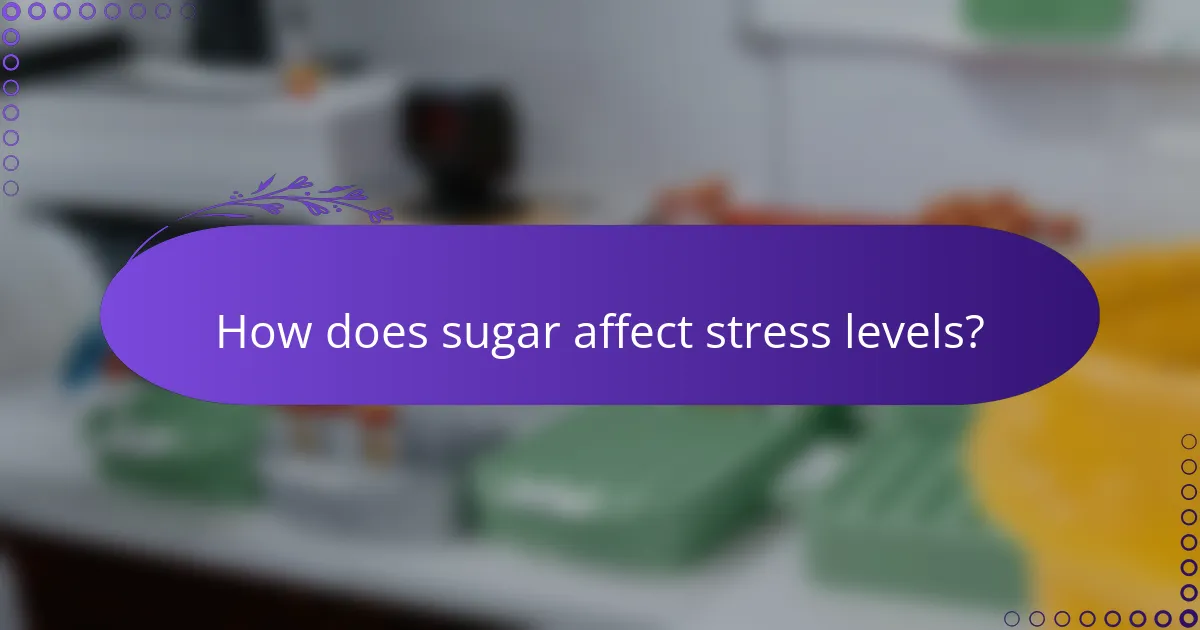
How does sugar affect stress levels?
Sugar can significantly impact stress levels by triggering hormonal changes and affecting mood stability. High sugar intake is linked to increased cortisol production, which can exacerbate feelings of stress and anxiety.
Increases cortisol production
Consuming sugar leads to spikes in blood glucose levels, prompting the body to release cortisol, a stress hormone. Elevated cortisol levels can create a cycle of stress, as they may lead to further cravings for sugary foods, perpetuating the issue.
To manage cortisol levels, consider reducing sugar intake and opting for complex carbohydrates, which provide a steadier source of energy without the rapid spikes associated with sugar.
Contributes to mood swings
High sugar consumption can cause rapid fluctuations in blood sugar, leading to mood swings and irritability. These swings occur as the body experiences a quick rise in energy followed by a crash, which can leave individuals feeling fatigued and anxious.
To stabilize mood, aim for a balanced diet rich in whole foods, including fruits, vegetables, and proteins, which can help maintain steady energy levels and reduce the likelihood of mood fluctuations.
Impacts overall mental health
Excessive sugar intake has been linked to various mental health issues, including anxiety and depression. The relationship between sugar and mental health is complex, as high sugar diets can lead to inflammation and other physiological changes that negatively affect mood.
To support mental well-being, consider limiting added sugars and focusing on nutrient-dense foods that promote brain health, such as omega-3 fatty acids found in fish and antioxidants present in berries.
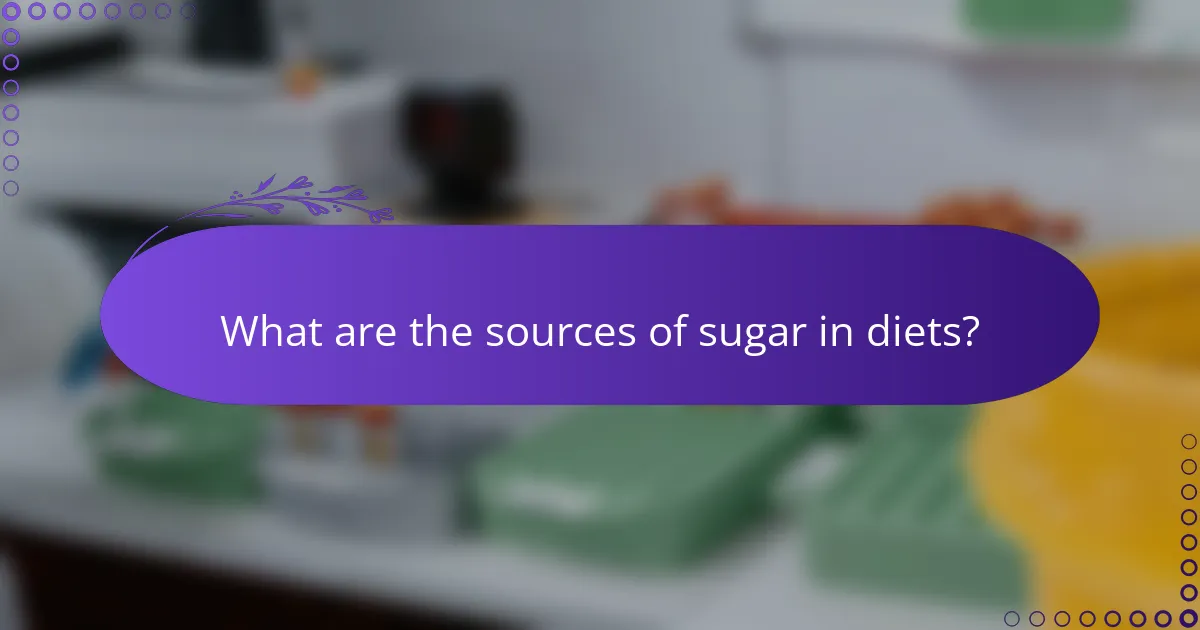
What are the sources of sugar in diets?
Common sources of sugar in diets include processed foods, sugary beverages, and confectionery products. These items often contain high levels of added sugars, which can contribute to increased stress levels and other health issues.
Processed foods
Processed foods are a significant source of added sugars, often hidden in items like sauces, dressings, and ready-to-eat meals. These products can contain sugars to enhance flavor and improve shelf life, making it essential to read labels carefully.
Many processed foods can have sugar content ranging from a few grams to over 20 grams per serving. Opting for whole, unprocessed foods can help reduce sugar intake and improve overall health.
Sugary beverages
Sugary beverages, including sodas, energy drinks, and sweetened teas, are among the largest contributors to daily sugar consumption. A single can of soda can contain around 30 to 40 grams of sugar, which is often more than the recommended daily limit for added sugars.
Reducing or eliminating sugary drinks from your diet can significantly lower your sugar intake. Consider replacing them with water, herbal teas, or unsweetened beverages to maintain hydration without added sugars.
Confectionery products
Confectionery products, such as candies, chocolates, and baked goods, are typically high in sugar. These items can contain anywhere from 10 to 30 grams of sugar per serving, making them a major source of added sugars in many diets.
To manage sugar consumption, limit the intake of these treats and consider healthier alternatives like fruits or dark chocolate with lower sugar content. Being mindful of portion sizes can also help in reducing overall sugar intake.
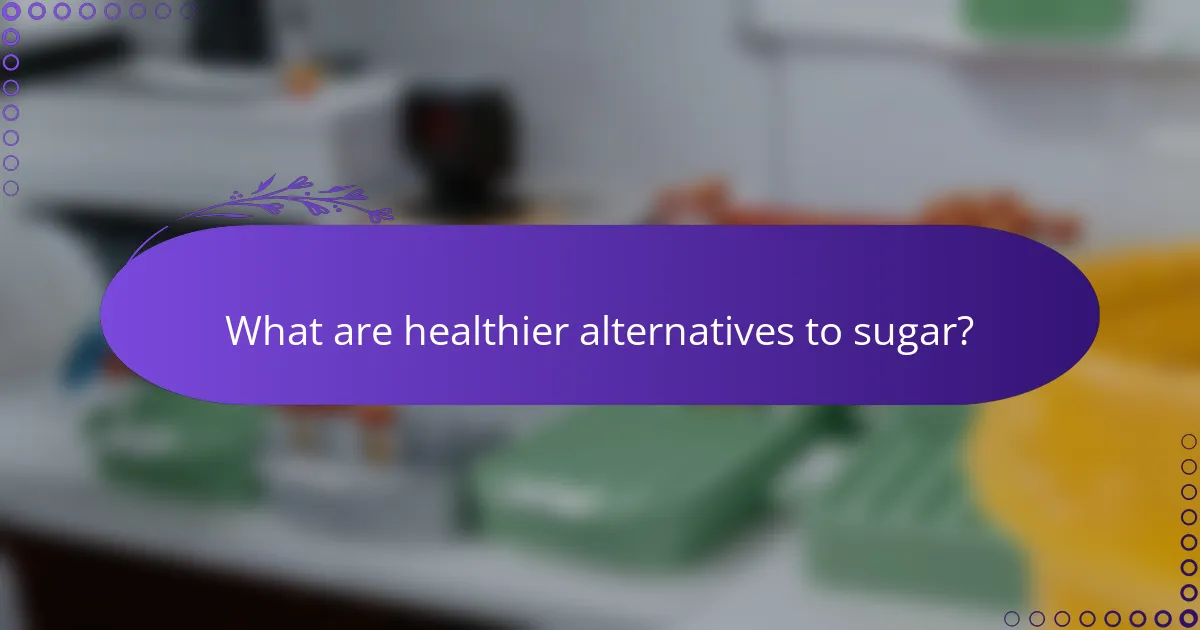
What are healthier alternatives to sugar?
Healthier alternatives to sugar can help reduce stress levels while satisfying sweet cravings. Options like stevia, honey, and maple syrup provide natural sweetness with varying health benefits and glycemic impacts.
Stevia
Stevia is a natural sweetener derived from the leaves of the Stevia rebaudiana plant. It is significantly sweeter than sugar but contains no calories, making it a popular choice for those looking to reduce sugar intake. When using stevia, it’s important to start with small amounts, as its sweetness can be quite potent.
Stevia has a minimal effect on blood sugar levels, making it suitable for diabetics. However, some people may find its taste slightly different from sugar, so experimenting with brands can help find one that suits your palate.
Honey
Honey is a natural sweetener produced by bees and contains various vitamins and minerals. While it is sweeter than sugar, it has a higher calorie count, so moderation is key. Honey also has antimicrobial properties and can aid in digestion, making it a beneficial alternative.
When choosing honey, opt for raw or unprocessed varieties to retain the most nutrients. Keep in mind that honey can still raise blood sugar levels, so it’s best used sparingly, especially for those managing diabetes.
Maple syrup
Maple syrup is made from the sap of sugar maple trees and is rich in antioxidants and minerals like manganese and zinc. It has a lower glycemic index compared to regular sugar, which means it may have a less dramatic impact on blood sugar levels.
When selecting maple syrup, look for 100% pure varieties without added sugars or artificial ingredients. Use it in moderation, as it is still high in calories, but it can be a flavorful addition to recipes or as a topping for various dishes.
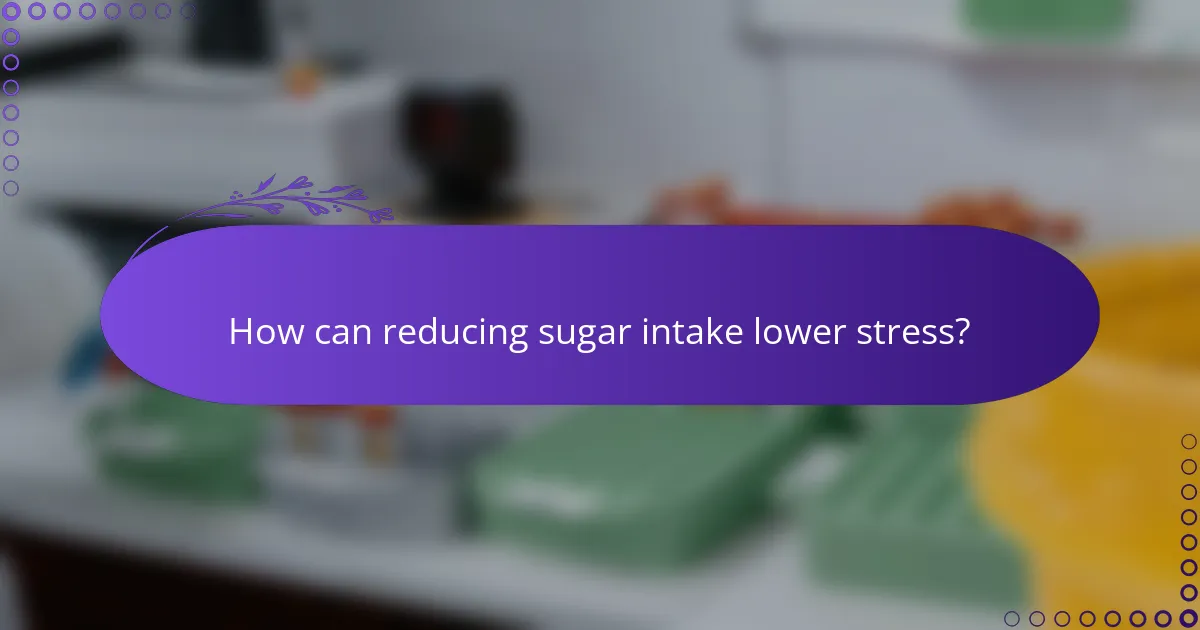
How can reducing sugar intake lower stress?
Reducing sugar intake can significantly lower stress by stabilizing blood sugar levels and improving mood regulation. When sugar consumption is minimized, the body experiences fewer spikes and crashes in energy, leading to a more balanced emotional state.
Stabilizes blood sugar levels
High sugar consumption can lead to rapid fluctuations in blood sugar, which may cause irritability and anxiety. By cutting back on sugar, individuals can maintain steadier blood sugar levels, reducing the likelihood of mood swings and stress responses.
To achieve stable blood sugar, focus on whole foods such as vegetables, whole grains, and lean proteins. Aim for meals that include a balance of macronutrients to help sustain energy levels throughout the day.
Improves mood regulation
Reducing sugar can enhance mood regulation by decreasing the likelihood of sugar-induced crashes that can lead to feelings of fatigue and irritability. A diet lower in sugar can promote better overall mental health.
Incorporate foods rich in omega-3 fatty acids, such as fatty fish and walnuts, as well as those high in fiber, like legumes and whole grains, to support mood stability. Consider keeping a food diary to track how your mood correlates with sugar intake.
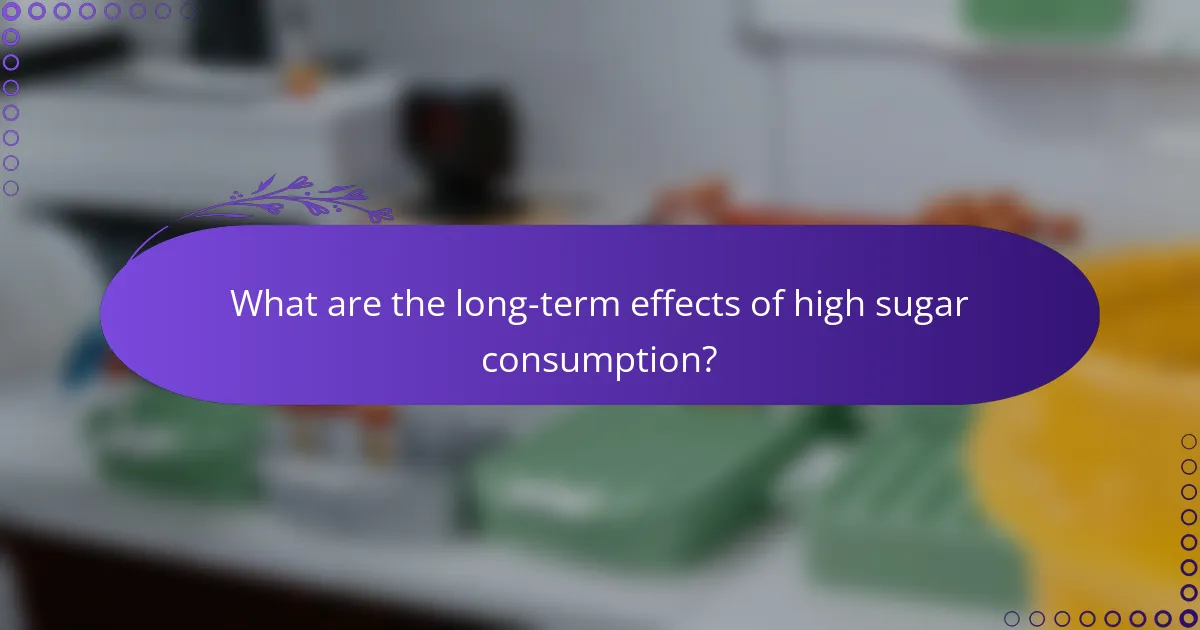
What are the long-term effects of high sugar consumption?
High sugar consumption can lead to various long-term effects, including increased anxiety and a higher risk of depression. These effects stem from the way sugar impacts brain chemistry and overall health.
Increased anxiety
Excessive sugar intake can contribute to heightened anxiety levels. When sugar is consumed, it causes a spike in blood glucose, followed by a rapid drop, which can lead to feelings of irritability and nervousness.
Additionally, high sugar diets may disrupt the balance of neurotransmitters in the brain, such as serotonin, which plays a crucial role in mood regulation. This imbalance can exacerbate anxiety symptoms over time.
Higher risk of depression
Long-term high sugar consumption is associated with an increased risk of developing depression. Research suggests that diets high in refined sugars may lead to inflammation and oxidative stress, both of which are linked to depressive disorders.
Moreover, the frequent fluctuations in blood sugar levels can affect energy and mood stability, potentially leading to depressive symptoms. To mitigate this risk, consider reducing sugar intake and opting for whole foods that stabilize blood sugar levels.
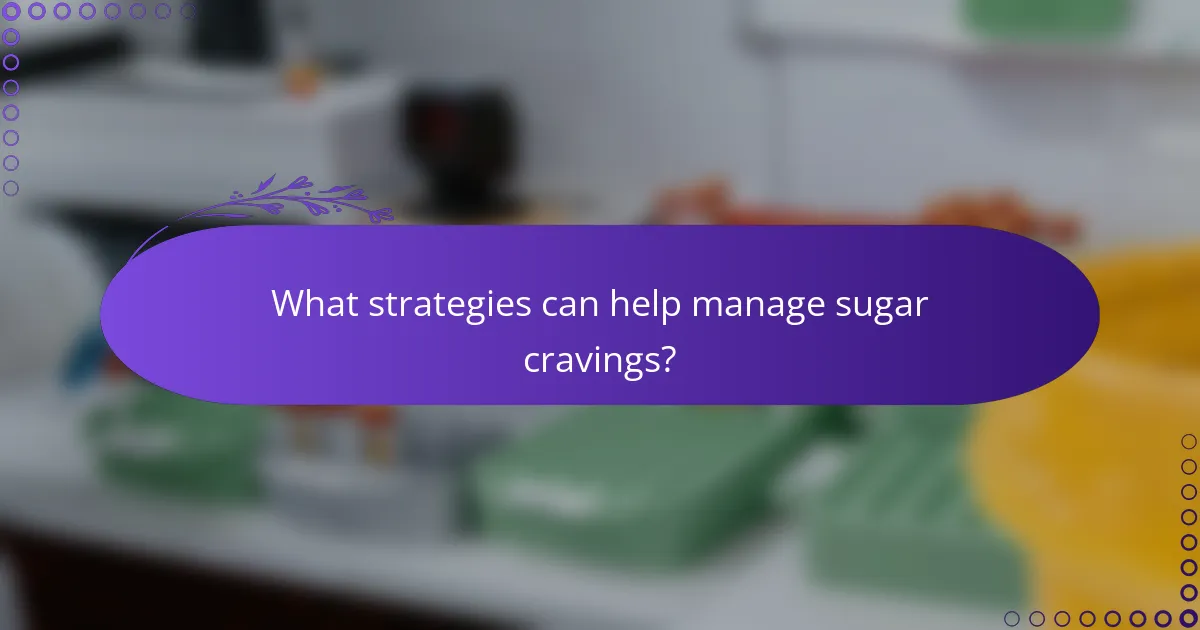
What strategies can help manage sugar cravings?
To effectively manage sugar cravings, consider implementing strategies that focus on balanced nutrition, mindful eating, and alternative sweeteners. These approaches can help reduce the desire for sugary foods and promote healthier eating habits.
Mindful eating practices
Mindful eating involves paying full attention to the experience of eating and drinking, which can help you recognize true hunger and fullness cues. By slowing down and savoring each bite, you may find that you enjoy your food more and feel satisfied with smaller portions.
To practice mindful eating, try eliminating distractions during meals, such as screens or multitasking. Focus on the flavors, textures, and aromas of your food, and take time to chew thoroughly. This can lead to a greater appreciation of your meals and a decreased likelihood of reaching for sugary snacks.
Additionally, consider keeping a food journal to track your cravings and emotional triggers. This can help you identify patterns and develop healthier coping mechanisms when cravings arise. Aim to replace sugary snacks with nutritious options like fruits, nuts, or yogurt to satisfy your cravings without the added sugar.

